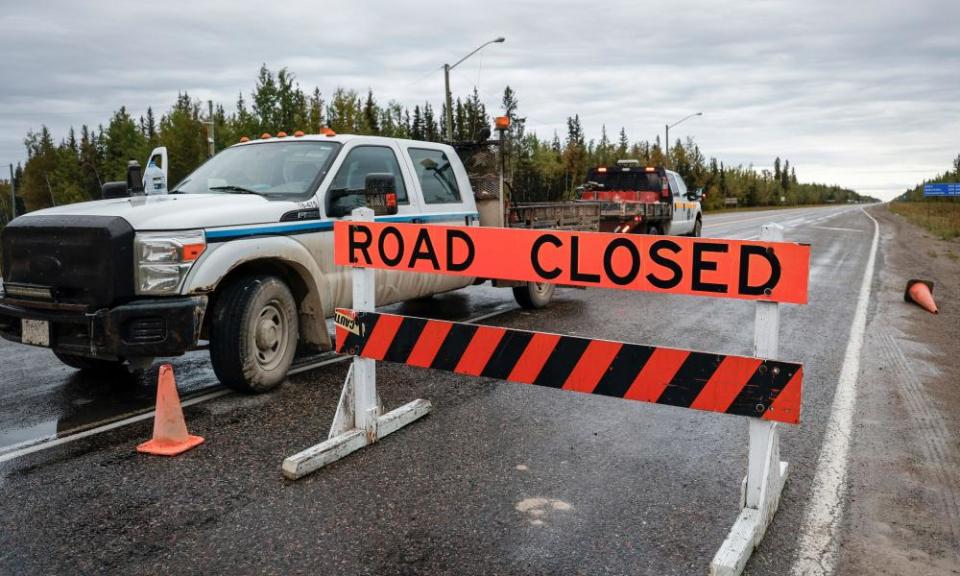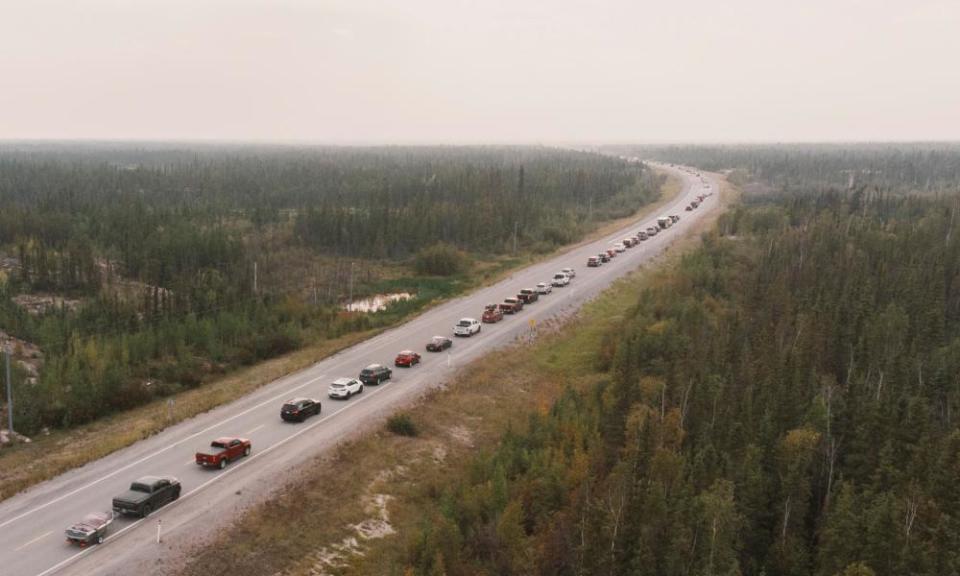Yellowknife wildfire: communication issues and Facebook news ban hamper evacuation efforts

Communication issues, fast-spreading rumours and a Facebook news ban have all disrupted evacuation efforts by residents of Yellowknife, in Canada’s Northwest Territories, as they race to leave the city before an out-of-control wildfire hits in the coming day or so.
On Wednesday night, officials told the city’s 20,000 residents they had to be out by Friday at noon (1900 BST) before a massive wildfire gets any closer.
Related: Yellowknife wildfire: traffic clogs road out of town as residents race to evacuate
There were 236 fires actively burning across Northwest Territories, with the four closest to Yellowknife in the North Slave region having burned through a collective 447,978 hectares and counting.
The fires also prompted the evacuation of other nearby towns, including the Dene First Nation communities of N’dilo and Dettah, with more than half of the territory’s residents under orders to leave their communities.
With multiple evacuations across the region, some resident reported difficulties in staying on top of the fast-changing details. Struck by the inability to share news links on Facebook due to Meta’s news ban in Canada – as well as poor cellular reception in some areas – people in Yellowknife and surrounding communities are relying on word-of-mouth and the radio to get up-to-the-minute information.
Related: ‘Disaster’: warning for democracy as experts condemn Meta over Canada news ban
Citizens and news organisations in Canada are barred from posting news links to Facebook and Instagram, after the technology giant disabled access last month due to a row with the federal government over legislation that would force internet giants to pay news publishers.
Katrina Nokleby, an elected official and geological engineer in Yellowknife, said the social media platform was now rife with misinformation about the fires and encouraged people to check out local network Cabin Radio’s live blog to get the facts.
Canada is enduring its worst wildfire season, with more than 1,000 active fires burning across the country, including 236 in the Northwest Territories.
Long lines of traffic have clogged the only road out of Yellowknife.
Ten planes left Yellowknife on Thursday with 1,500 passengers, said Jennifer Young, director of corporate affairs for the Northwest Territories’ Department of Municipal and Community Affairs, adding that they hope to have 22 flights leave on Friday with 1,800 more passengers.

Yellowknife’s mayor, Rebecca Alty, warned residents to bring water and food with them to the city’s airport as they could face long waits to get on a flight. Evacuation flights are only for those who cannot leave by road, who are immunocompromised or who have conditions that put them at higher risk, officials said.
Authorities have warned that the fire is just 15km from the city and inching closer all the time. “The area is effectively encircled by fire at this time,” Mike Westwick, fire information officer for the Northwest Territories, said.
A second fire, closer to the community of Ingraham Trail, was also a significant threat at just 4km north of the town, he said.
Westwick said seven air tankers were able to do some fire suppression work on Wednesday night, but that might not have been enough. Future drops depend on visibility, and as the thick smoke rolled closer to Yellowknife, he said it was becoming harder for the pilots to make their drops.
Winds are pushing both fires toward Yellowknife, while thunderstorms in the forecast could also bring lightning, adding another potential fire risk to the equation.
“We’ve got some very tough days ahead,” Westwick said. “There is risk that it does reach the outskirts of Yellowknife by the weekend if we don’t get enough rain today.”
Communication has also been a significant challenge as people try to keep tabs on family and friends.
After being evacuated on Sunday from Hay River – a community on the other side of Great Slave Lake – Garth Carman lost track of his wife, Linda.
Carman told the Guardian that they became separated when the road they were travelling on in two separate vehicles became engulfed by fire.
“Suddenly it was a wave of flames. It just rolled across the highway and instantly the trees just started exploding,” he said.
Carman returned to Hay River but couldn’t find Linda. “All the internet and phone lines went down. There was zero communication.”
He later found out she’d been airlifted to Grand Prairie, Alberta.
Now together again, he and Linda are minding the 16 cats they rescued from the fire – three of their own and 13 they took in from people in Fort Smith when that community was evacuated a day earlier.

 Yahoo Finance
Yahoo Finance 